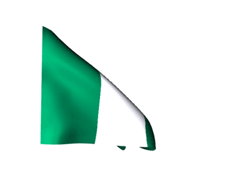



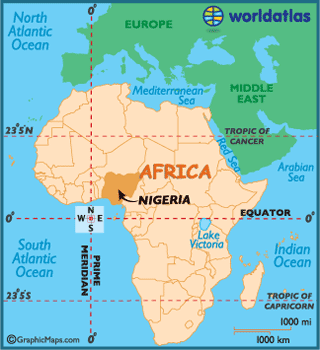
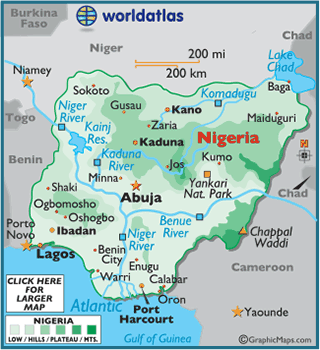
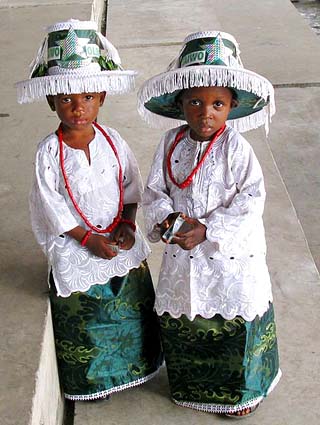

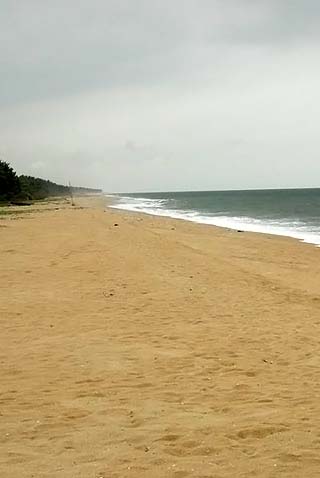
Tel Code..: +234
Ethopian Airlines - Air France- Lufthansa- Royal Air Maroc- THY-Emirates -KLM- Egypt Air
Viza..: Needs
Courses or boosters usually advised: Hepatitis A; Poliomyelitis; Tetanus; Typhoid; Yellow Fever.
Other vaccines to consider: Cholera; Diphtheria; Hepatitis B; Meningococcal Meningitis; Rabies.
Yellow fever vaccination certificate required for travellers over 1 year of age arriving from countries with risk of yellow fever transmission.
President: Goodluck Jonathan (2010)
Land area: 351,649 sq mi (910,771 sq km); total area: 356,667 sq mi (923,768 sq km)
Population (2010 est.): 152,217,341 (growth rate: 1.9%); birth rate: 36.0/1000; infant mortality rate: 92.9/1000; life expectancy: 47.2; density per sq km: 151
Capital (2003 est.): Abuja, 590,400 (metro. area), 165,700 (city proper)
Largest cities: Lagos (2003 est.), 11,135,000 (metro. area), 5,686,000 (city proper); Kano, 3,329,900; Ibadan, 3,139,500; Kaduna, 1,510,300
Monetary unit: Naira
Name: Naira
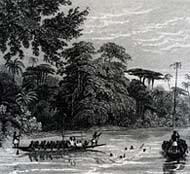
Located in Western
Africa,
the Federal Republic of Nigeria (named for the Niger River) is the most populous
country ofAfrica.
People began settling the region as far back as 9000 BC, but it wasn't until the
9th century that the country began to flourish under the ruling of the Kanem-Bornu
Empire.
Hausa states developed during the 11th century, and, along with the Kanem-Bornu
Empire, prospered as a trading post between northern and western Africa.
In the 16th century, the first European explorers
fromSpain and Portugal arrived,
and quickly established trade connections.
British influence
and control over what would become Nigeria grew through the 19th, however the
country remained divided into northern and southern provinces. In the south, the
economy and education expanded more quickly than the north.
A series of constitutions after World War II granted Nigeria greater autonomy,
and in 1960 the country gained complete independence.
From the beginning, ethnic and religious tension intensified between the already
unbalanced north and south. Several military coups followed sparking increased
violence, and consequently leading to the Nigerian Civil War in 1967.
Millions had lost their lives - most from hunger and disease - as the war came
to an end in 1970, and although reconstruction was quick the previous tensions
still remained.
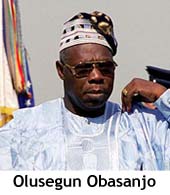 Following nearly 16
years of military rule, a new constitution was adopted in 1999 with the election
of Olusegun Obasanjoas as the new president and a peaceful transition to
civilian government was completed.
Following nearly 16
years of military rule, a new constitution was adopted in 1999 with the election
of Olusegun Obasanjoas as the new president and a peaceful transition to
civilian government was completed.
Obasanjo was faced with the daunting task of reforming a petroleum-based economy,
whose revenues had been spent through corruption and mismanagement and the
institutionalizing of democracy. In addition, the Obasanjo administration had to
diffuse long-standing ethnic and religious tensions, in order to build a sound
foundation for economic growth and political stability.
Umaru Yar'Adua, of the People's Democratic Party, was elected President during
the general election of 2007. The international communities condemned the
election as being largely flawed.
On May 5, 2010, Adua passed away, and Dr. Goodluck Jonathan was sworn in as
Nigeria's newest president.
Nigeria's economy is one of the fastest growing in the world and is the second
largest in Africa.
Nigeria has the highest population of all African countries
and is the eighth most populous in the world.

The landscape of Nigeria varies with mangrove forests and swamps bordering the
southern coast, and hardwood forests further inland.
The Niger and Benue River valleys make up Nigeria's most expansive region,
merging into each other to form a distinctive 'Y' shape.
The Mambilla Plateau, the highest in the country, forms the area southeast of
the Benue, and is punctuated by hills and mountains, extending into the border
withCameroon.
Filling in the space between the far south and far north is a vast savannah made
up of three zones: The Guinean forest-savanna mosaic, Sudan savannah and the
Sahel savannah. Rain falls sparsely in the Sahel savannah, located in the
northeast, and subsequently the Sahara Desert is encroaching.
Nigeria's highest point is Chappal Waddi at 7,936 ft (2,419 m); the lowest point
of the country is the Atlantic Ocean (om).
The country shares Lake Chad in the northeast withNiger, Chad and Cameroon
Climate:
The climate of Nigeria is generally hot throughout the year, with very little
difference between summer and winter conditions.
During the wet season (April through October) rainfall often exceeds 120 inches,
especially along the southeastern coast. The dry season runs November through
March.
The economy of Nigeria historically was based on agriculture, and about 70% of the workforce is still engaged in farming (largely of a subsistence type). The chief crops are cocoa, peanuts, palm oil, corn, rice, sorghum, millet, soybeans, cassava, yams, and rubber. In addition, cattle, sheep, goats, and pigs are raised.
Petroleum is the leading mineral produced in Nigeria and provides about 95% of foreign exchange earnings and the majority of government revenues. It is found in the Niger delta and in the bights of Benin and Biafra. Petroleum production on an appreciable scale began in the late 1950s, and by the early 1970s it was by far the leading earner of foreign exchange. The growing oil industry attracted many to urban centers, to the detriment of the agricultural sector, and the huge government revenues from oil led to widespread corruption that has continued to be a problem. In the 1980s a decline in world oil prices prompted the government to bolster the agricultural sector. Nonetheless, both refinery capacity and agriculture have not kept pace with population growth, forcing the nation to import refined petroleum products and food. Other minerals extracted include tin, iron ore, coal, limestone, columbite, lead, zinc, and gold.
Industry in Nigeria includes the processing of agricultural products and minerals, and the manufacture of textiles, construction materials, footware, chemicals, fertilizer, and steel. Fishing and forestry are also important to the economy, and there is small commercial shipbuilding and repair sector. In addition, traditional woven goods, pottery, metal objects, and carved wood and ivory are produced. Nigeria's road and rail systems are constructed basically along north-south lines; the country's chief seaports are Lagos, Warri, Port Harcourt, and Calabar.
Except when oil prices are low, Nigeria generally earns more from exports than it spends on imports. Other important exports include cocoa, rubber, and palm products. The main imports are machinery, chemicals, transportation equipment, manufactured goods, food, and live animals. The United States is by far the largest trading partner, followed by China, Brazil, Spain, and Great Britain.
Nigeria is governed under the constitution of 1999 as amended. The president, who is both head of state and head of government, is popularly elected for a four-year term and is eligible for a second term. The bicameral legislature, the National Assembly, consists of the 109-seat Senate and a 360-seat House of Representatives; all legislators are elected by popular vote for four-year terms. Administratively, the country is divided into 36 states and the federal capital territory.
The Niger River and its tributaries (including the Benue, Kaduna, and Kebbi rivers) drain most of the country. Nigeria has a 500-mile (800-km) coastline, for the most part made up of sandy beaches, behind which lies a belt of mangrove swamps and lagoons that averages 10 mi (16 km) in width but increases to c.60 mi (100 km) wide in the great Niger delta in the east. North of the coastal lowlands is a broad hilly region, with rain forest in the south and savanna in the north. Behind the hills is the great plateau of Nigeria (average elevation 2,000 ft/610 m), a region of plains covered largely with savanna but merging into scrubland in the north. Greater altitudes are attained on the Bauchi and Jos plateaus in the center and in the Adamawa Massif (which continues into Cameroon) in the east, where Nigeria's highest point (c.6,700 ft/2,040 m) is located.
In addition to Abuja and Lagos, other major cities include Aba, Abeokuta, Ado, Benin, Enugu, Ibadan, Ife, Ilesha, Ilorin, Iwo, Kaduna, Kano, Maiduguri, Mushin, Ogbomosho, Onitsha, Oshogbo, Port Harcourt, and Zaria.
Nigeria is easily the most populous nation in Africa and one of the fastest growing on earth. The inhabitants are divided into about 250 ethnic groups. The largest of these groups are the Hausa and Fulani in the north, the Yoruba in the southwest, and the Igbo in the southeast. Other peoples include the Kanuri, Nupe, and Tiv of the north, the Edo of the south, and the Ibibio-Efik and Ijaw of the southeast. English is the official language, and each ethnic group speaks its own language. About half of the population, living mostly in the north, are Muslim; another 40%, living almost exclusively in the south, are Christian; the rest follow traditional beliefs. Religious and ethnic tensions have at times led to deadly violence in which hundreds of Nigerians have died.